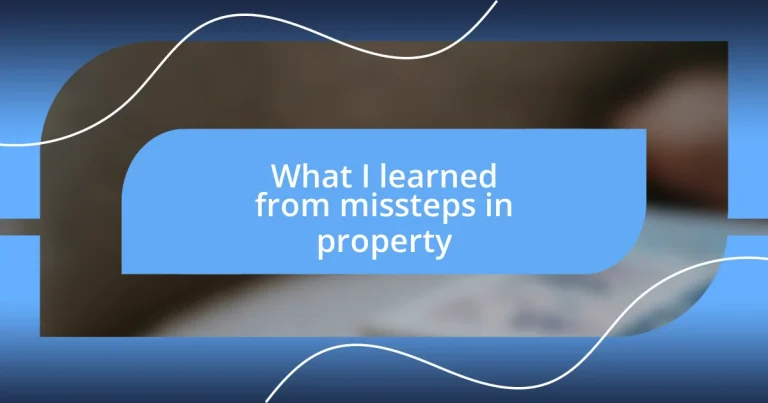Key takeaways:
- Conduct thorough due diligence, including inspections and market analysis, to avoid costly surprises.
- Establish a solid property management strategy and consider professional help to alleviate the burden of responsibilities.
- Create a proactive action plan with specific goals to anticipate challenges and optimize property value effectively.
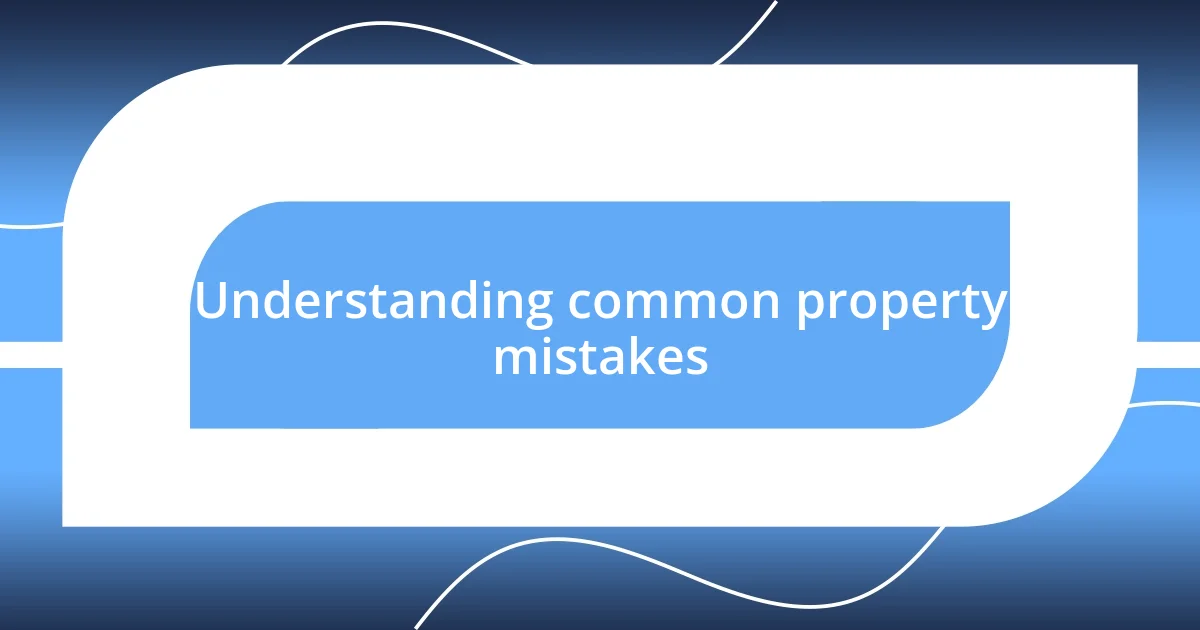
Understanding common property mistakes
One common mistake that I see, particularly among new investors, is underestimating the importance of due diligence. When I bought my first property, I had my eyes set on the potential rental income but completely overlooked the extensive repairs needed. Have you ever felt that rush to close a deal, only to find out later that you might have jumped in too quickly?
Another pitfall is neglecting to consider location, which can make or break your investment. I once invested in a property because the price was right, but it was situated in an area with few amenities. Looking back, I ask myself: was the short-term savings worth the long-term frustration of dealing with high vacancy rates? Location isn’t just about the current trends; it’s about future growth potential and livability.
Additionally, many overlook the significance of a solid property management plan. In my early days, I thought I could manage everything myself, but quickly realized it was more than I could handle. It’s crucial to ask: do you really want to juggle repairs, tenant communications, and legal obligations all on your own? Taking the time to find the right management can save you countless headaches down the road.

Analyzing my past experiences
Analyzing my past experiences has been a real eye-opener. I recall one instance when I hastily finalized a purchase without properly reviewing the property’s inspection report. The excitement of my first investment blinded me to critical issues. Looking back, I often think about those surprise expenses—each repair felt like a kick in the gut. It’s frustrating how one small oversight can ripple into a cascade of problems.
In another scenario, I ignored the importance of understanding the local market dynamics. I was captivated by the charming facade of a house, but that lured me into a neighborhood with fluctuating property values. I felt a grim sense of disbelief when the market dropped post-purchase. The lesson here? Having a broad view of the market isn’t just advisable; it’s essential.
Finally, my experience with financing taught me that every option isn’t created equal. I once accepted the first mortgage offer I received, assuming it was as good as it gets. But later, I discovered better terms were out there! There’s a sense of regret that comes from feeling uninformed. It’s a constant reminder that taking the time to research financing options can significantly enhance my investment outcomes.
| Misstep | Lesson Learned |
|---|---|
| Skipped Property Inspection | Always prioritize thorough inspections to avoid surprises. |
| Poor Market Analysis | Consider both the property’s charm and the market dynamics before purchasing. |
| Naive Financing Decisions | Research multiple financing options for better investment outcomes. |
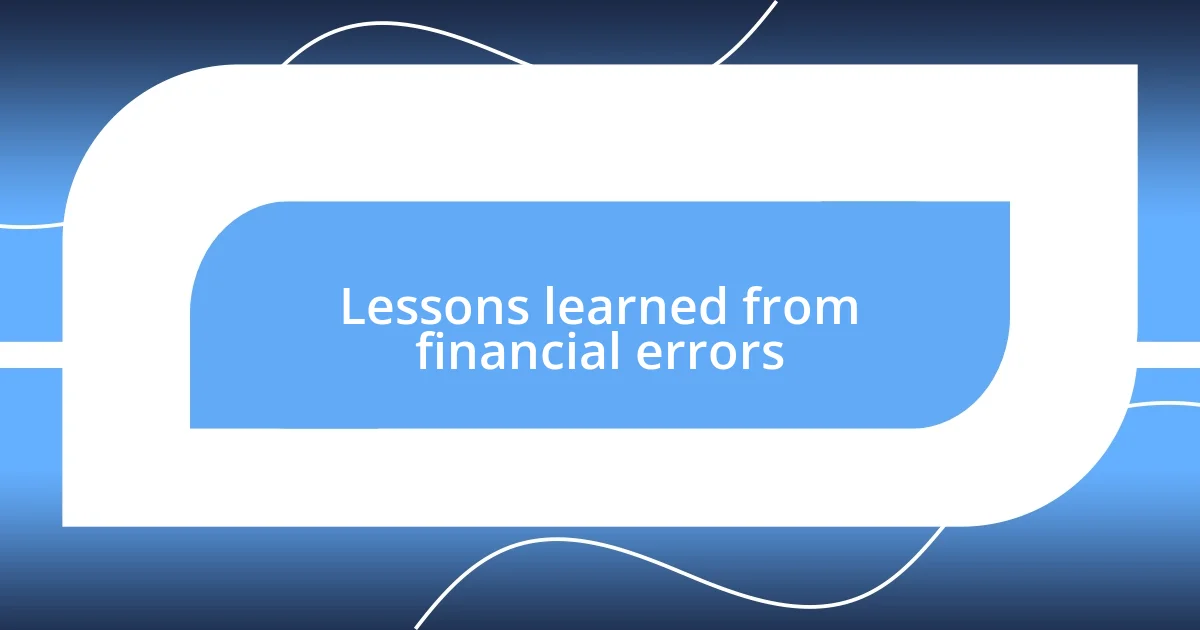
Lessons learned from financial errors
Of all the financial errors I’ve made, the one that stings the most still echoes in my mind. I once decided to skimp on the budget for a property renovation, thinking I could save money by taking shortcuts. In the end, those choices led to costly repairs I hadn’t anticipated, pulling me deeper into unexpected expenses and frustration. It taught me that saving a few bucks upfront can often result in much larger costs down the line.
Here are a few pivotal takeaways from my financial missteps:
- Cutting corners rarely pays off. Every dollar saved initially can quickly multiply into a loss when repairs become necessary.
- Do not overlook additional costs. Renovations often come with hidden expenses that can derail your budget.
- Prioritize quality over cheap solutions. Investing in better quality work can safeguard against future financial pitfalls.
I’ll forever remember the stress-induced headache that accompanied my reluctance to seek help from experts. When I decided to DIY a complicated renovation, what I thought would be a fun project turned into a financial disaster. It was a harsh lesson in recognizing my limitations. Understanding when to call in the professionals could have saved me both time and money. That experience stands as a reminder: sometimes, investing in expertise can be the best financial decision you make.
From my experiences, consider these essential points:
- Seek professional advice when necessary. An expert can help avoid costly mistakes that stem from inexperience.
- Don’t underestimate the value of proper budgeting. Always plan for unexpected expenses, adding a buffer to your finances.
- Reflect on past decisions regularly. Understanding what went wrong can prevent future missteps from resurfacing.
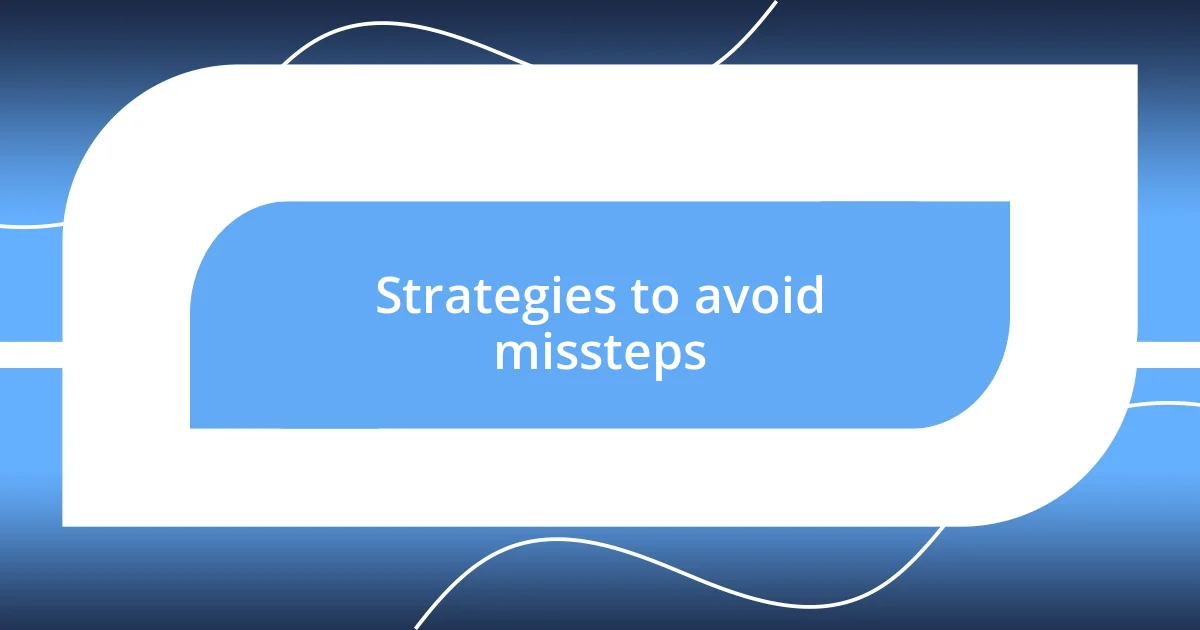
Strategies to avoid missteps
When I think about avoiding missteps in property investment, one strategy stands out — the power of a solid network. Early in my journey, I didn’t realize how much I could benefit from connecting with experienced investors and real estate professionals. Now, I make it a point to attend local real estate meetups and engage with online forums. Sharing experiences and learning from others has saved me from countless pitfalls. How often do we underestimate the wisdom of those who have gone before us?
Another critical approach I’ve embraced is maintaining a due diligence checklist for every property I consider. I remember almost skipping this step for a stunning downtown condo, thinking I knew everything based on a quick look. But a thorough checklist forced me to dig deeper, revealing zoning issues that could have turned my dream into a nightmare. It reminds me that sometimes, a little extra time spent on research can lead to significant long-term savings. After all, why risk it when a simple list could provide clarity?
Lastly, I’ve learned the importance of visualizing my investments beyond just numbers. When I was solely focused on potential profit, I overlooked how a property felt in terms of livability and community. One time, I thought a property would be a goldmine, but it later became apparent it lacked amenities that attracted long-term tenants. This experience has taught me that emotions play a substantial role in real estate decisions. Are we investing in property or just dollar signs? Creating a balance between financial metrics and emotional satisfaction has become my personal mantra.

Importance of thorough research
Research is the backbone of any successful property venture. I remember visiting a neighborhood that initially seemed perfect—charming streets, lovely parks. But digging deeper revealed issues: high crime rates and failing local schools. Had I not conducted that thorough research, I might have made an impulsive purchase that would have haunted me for years.
Another experience comes to mind when I decided to skip the local market analysis before buying my first investment property. I assumed that the rising trend would continue, only to discover that a major employer had announced layoffs. The market took a nosedive, and I was left holding a property that lost value rapidly. It was a hard lesson about the importance of keeping an eye on economic indicators. Knowing how the local economy is heading is crucial—what’s the point of investing in a property that could depreciate drastically?
I’ve also found that researching not just the property, but the community is essential. Once, I was enamored by a beautiful home, but the vibe of the neighborhood didn’t feel right. After spending more time there, I realized that the potential rental audience was non-existent. It’s easy to get swept away by aesthetics, but the heart of property investment lies in understanding the people who will fill those spaces. Are we really thinking about who will live in these homes, or just chasing a picture-perfect facade? Balancing emotional and practical research can lead to making choices I can be proud of down the road.
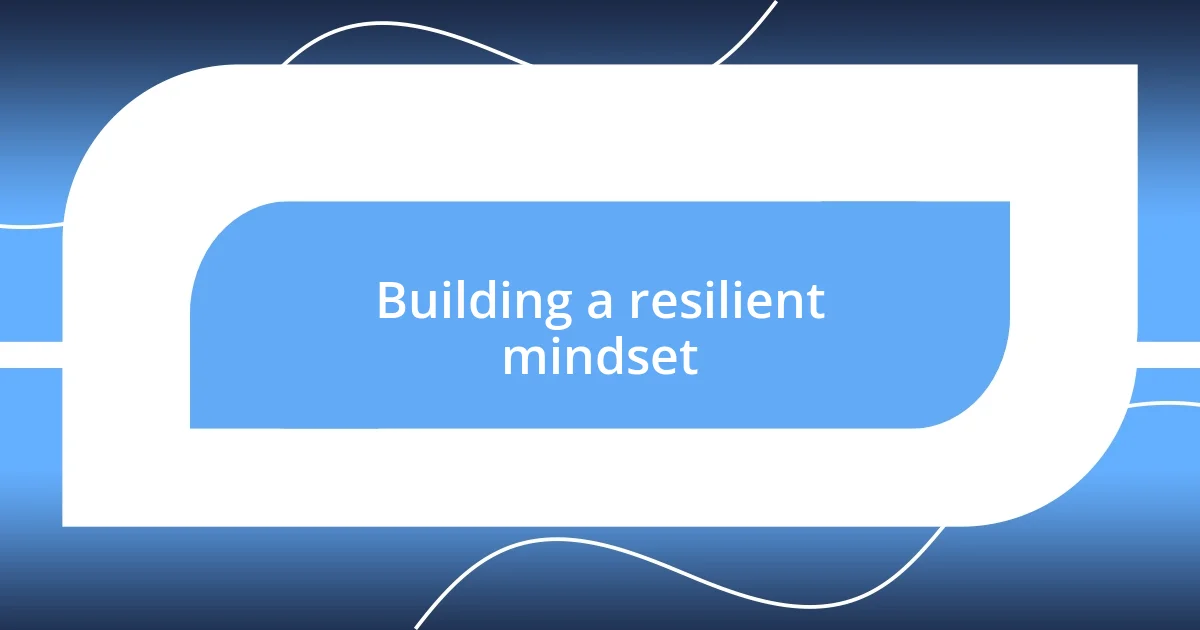
Building a resilient mindset
Building a resilient mindset is something I’ve come to value profoundly. I recall a particularly tough moment when a property I thought was foolproof turned out to be riddled with hidden issues. Instead of letting it crush my spirit, I took a step back and assessed what went wrong. This process taught me that setbacks are not the end; they’re just learning curves, nudging me toward better decisions next time. How do we view failure— as a wall or a stepping stone?
I’ve also learned the importance of adaptability in this business. One property deal fell through at the last minute, leaving me feeling disheartened. I remember sitting with my thoughts, initially overwhelmed, but then I decided to pivot and explore alternative investments. That experience made me realize resilience isn’t just about bouncing back, but about being open to new opportunities that may present themselves unexpectedly.
Furthermore, cultivating patience has been a game-changer for me. In the haste of wanting to succeed, I often rushed my decisions, only to regret them later. I vividly remember a property auction where I got caught up in the excitement and bid beyond my budget. The aftermath was a lesson in discipline—good things take time, and real estate is no exception. It’s essential to trust the process and allow the right opportunities to come to fruition in their own time. What’s the rush when passion drives the journey?
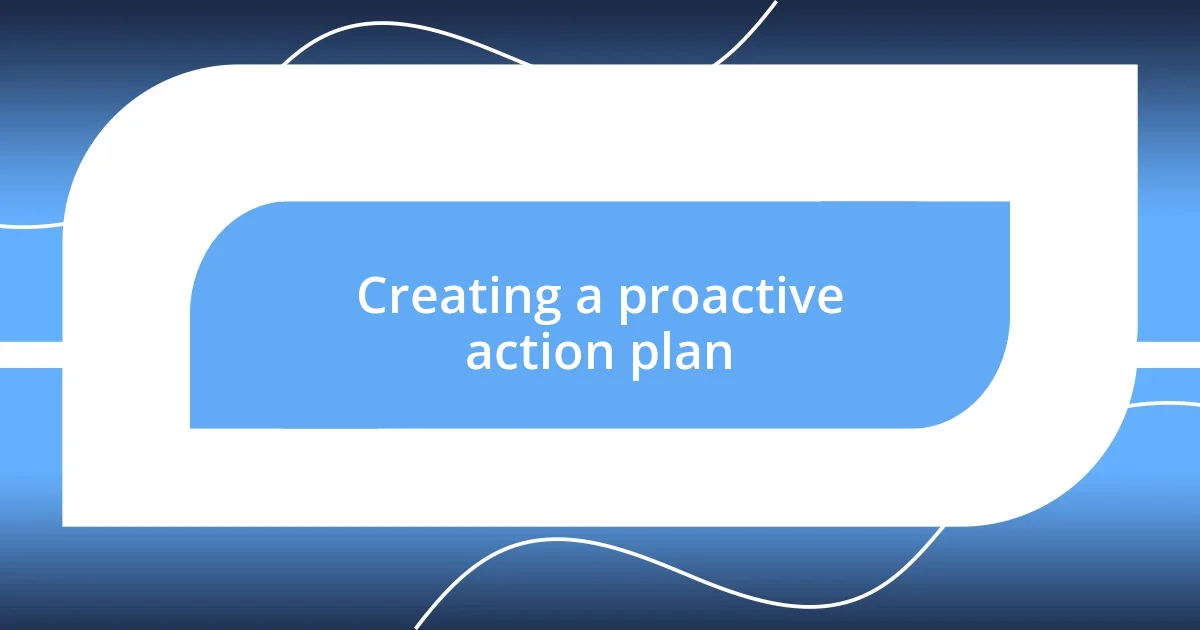
Creating a proactive action plan
Creating a proactive action plan is one of those essential steps that I wish I had embraced earlier in my property journey. I remember when I faced a property with unforeseen structural issues that could have been mitigated. Had I established a clear plan of action—including regular inspections and a checklist for necessary repairs—those problems would have felt less daunting. It’s all about anticipating challenges before they turn into crises.
I can’t stress enough the value of setting specific goals within that action plan. For example, during one of my projects, I aimed to improve my cash flow by identifying and cutting unnecessary expenses. By creating a detailed budget and mapping out a timeline for renovations, I was able to enhance my property’s value without overspending. What if I hadn’t taken that step? I can only imagine the frustration of missing out on potential profits.
Moreover, involving professionals from the start can make a world of difference. When I finally decided to work with property management experts, my stress levels decreased significantly. Their insights into tenant relations and maintenance created a smoother operating system for my properties. It begs the question: why wait until a problem arises to seek help? Building that network and preemptively planning can save time, money, and a lot of headaches in the long run. Creating a proactive action plan isn’t just a strategy—it’s my safety net in a challenging industry.












